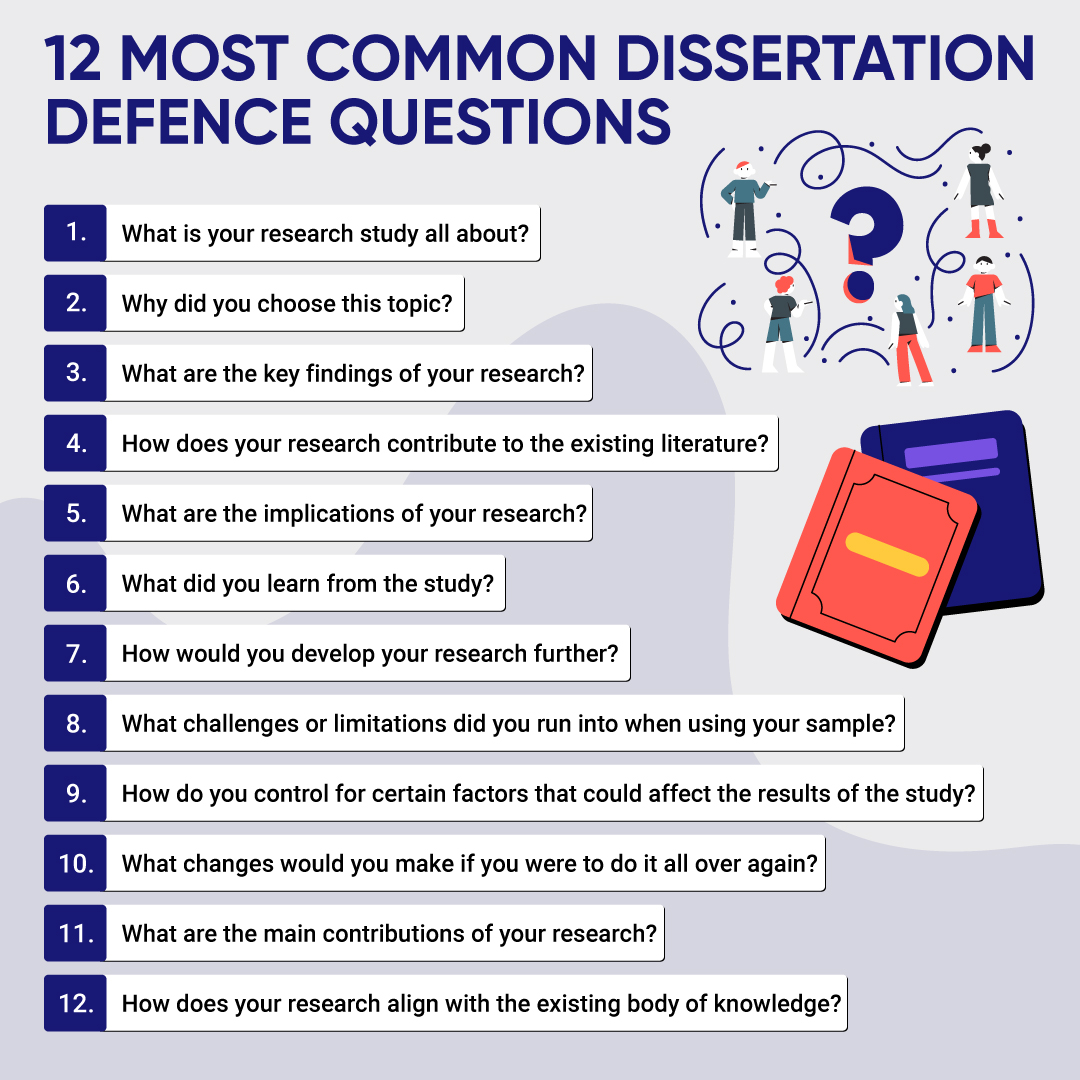The defence, an essential part of the academic career, gives the applicant a chance to show off their subject expertise and present their original research findings to a panel of professionals. The panel might also ask challenging questions to assess students’ understanding and critical thinking skills.
Also, the defence questions are mostly open-ended, and you have to explain your research in detail. You can also share any plans you have regarding your research topic. But it is not as easy as it seems, and for most students, defending a master’s or PhD dissertation might be a frightening adventure.
Many students feel dazzled in this phase and get assistance from dissertation helpers so that they can complete their projects. However, if you do proper research and preparation for your thesis defence, you can ace this easily. So, for your help, this article will address some of the most common questions for dissertation defence. In addition, it will offer insightful advice on how to properly respond to them.
12 Most Common Dissertation Defence Questions and Their Answers

There are multiple ways that help you present your research during one to two-hour meetings with your thesis committee members. They will test your preparation and understanding with some investigating questions. Since they all read your thesis previously, they will have questions about the topic, methodology, data sample, study, and other details.
We’ve compiled a list of the top 12 dissertation defence questions and their responses in this paper. This will help you go through this crucial stage of your academic career with grace and confidence.
Let’s explore how to answer all of the above questions asked in a dissertation defence:
1. What is Your Research Study All About?
One of the most important questions that you will need to respond to during your research project defence is, “What is your research study all about?“. This question is designed to help you convey Why/ How your research was conducted. We have a recommended strategy for answering this question successfully.
- We’ll start with a short introduction.
- Give a problem statement or research question.
- Describe the goals.
- Detailed description of the method of data collection and outcome measures.
- Emphasise the importance and possible consequences.
- Finish with a summary.
Example:
Although the question is straightforward, a deeper understanding of the topics will require technical knowledge. Here, we have provided you with an example. Let us assume that your research is focused on the “Explanation of particle accelerators and components of the dark matter in the universe.”
Your answer may sound as follows:
This review has examined the main aspects of dark matter and its detection models. I have built models of decomposing dark matter. In addition, I demonstrated the excess amount of positron in cosmic beams detected by PAMELA. I will further utilise the spectrum of cosmic-beam electrons and positrons to study these four fermions contact interactions, assuming a general Dirac structure.
A leptophilic supersymmetric Higgs model is proposed to explain the supposed gamma-ray excess in the centre of our galaxy. Finally, the Razor analysis interprets whether there could be any enhancement in dark matter collider searches.
2. Why Did You Choose This Topic?
In your dissertation defence questions session, you should respond to “Why did you choose this topic?” with a concise and understandable statement. Your response should highlight your motivation, the topic’s significance, and your level of interest.
To assist yourself in creating a strong response, consider the following guidelines:
- Show personal motivation and interest.
- Emphasise the topic’s relevance and punctuality.
- Highlight your experience and background.
- Describe the goals and research question.
Example
For example, if the title of your investigation was “Media Combat: The Great War and the Transformation of American Culture“, you can answer something like this;
I have always been fascinated by the First World War (1914–1918), and my main area of interest is learning more about the social climate of that era. I aimed to examine how the United States’ engagement in the war led to the creation of a nationalised cultural apparatus and how theatre and music changed the dynamic between the government and its citizenry.
3. What Are the Key Findings of Your Research?
When you discuss your main results, make sure you know how detailed the information should be provided, as most of the experts will ask for it. Develop three levels of your summary that you have:
- A broad explanation (1 minute or less)
- How this study went about (3-5 minutes)
- Finally, explain it further (10-15 minutes.
When you have each of these answers available, you may determine which is most appropriate at that particular time, depending on the questions your panel poses and the requests that have already been made.
4. How Does Your Research Contribute to the Existing Literature?
Your dissertation must address: “How does your research add to what is already out there in the literature? It is essential for proving the importance of your work and showing that you have a good knowledge of the existing state-of-the-art. Consider the following issues regarding dissertation defence questions and answers about its contribution to existing literature:
Contextualising Your Research
Provide a background on work that was already written in your subject field. Stressing the main issues, conflicts and question marks. It will indicate that you are well aware of the subject and help in framing your study. Always cite scholarly works and relevant studies to support your claims.
Finding the Weaknesses and Limitations
In this section, describe the gaps or deficiencies in the literature that your research hopes to address. This might involve gaps in the theory, methodological problems, and areas where contradictory results are found from prior studies. Explain, with precision, how the results of your work will refine or challenge the current knowledge and contribute to a deeper comprehension of this subject.
5. What are the Implications of Your Research?
During your dissertation defence, the panel will question you about the implications of your research. They want to know how your work advances the field, shapes future investigations, and impacts practical applications. To properly respond to this question, you must describe the broader implications of your research, both inside and outside of the academic community. .
This is how you should arrange your answer:
Consider the Academic Implications First.
- Contribution to Theory
- Let’s start by talking about how your study advances the current understanding of the subject.
- Describe how your research supports, extends or contradicts accepted ideas.
- Emphasise any fresh ideas, frameworks, or models that resulted from your research.
Talk about the Methodological Consequences
- Novel Strategies
- Talk about the consequences, whether your research included creative applications of pre-existing techniques or brand-new approaches.
- Describe how the methodological decisions you made will affect the future research plans in your field.
- Think about sharing any resources, methods, or processes that other researcher could find useful.
Examine The Practical Consequences
- Practical Uses
- Now, go on to talking about how your findings will be used in real-world situations.
- Determine how your study can influence practice, policy, or industry standards.
- Give definite examples of how your research could be applied in practical settings.
- Impact on Stakeholder
- Talk about who benefited from your study.
- Think about stakeholders like practitioners, legislators, and business leaders.
- Tell us how your research can help make decisions or advance the field in which you study.
6. What Did You Learn from the Study?
One of the dissertation oral defence questions is “What Had You Learned from The Study?” The answer should be in-depth, well-structured and considerate. This is an opportunity to discuss what you found and how it advances research.
Below are some tips that you will be able to use to answer this dissertation defence question.
- Develop a deeper understanding of the concept of any idea or theory.
- Found some significant patterns or trends in the field or problem you were investigating.
- Develop a novel approach for the methods of analysis you described in the dissertation.
- Acknowledged the significance of the elements of the research process, like data integrity, ethical issues, etc., in the field of study.
- Became more skilled at what research technique you chose to apply, such as statistical analysis, qualitative coding, etc.
In your concluding remarks, highlight how the knowledge you have gained will guide your future research and academic goals. You might also discuss any possible directions for future research that your findings brought to light. However, if you have employed the services of a dissertation writing company, you can ask them to provide you with a detailed answer to this question as well so that you can easily defend it in front of the panel.
7. How Would You Develop Your Research Further?
When it comes to a dissertation, you should discuss the question “How would you develop your research further?” with a specific plan and vast vision. Your response should touch on both the concept of the boundaries of your field of research that you have learned and the ideas.
Here is how you should format your response:
- To show that your research is valuable as a starting point for further development, identify what it currently contributes to.
- Stress the deficiencies in and conditions of your research and make recommendations for avoiding these in further investigations.
- Give specific research issues or hypotheses that you think follow from your conclusions and need further investigation.
- Provide any recommendations for alternative approaches that might facilitate your inquiry, such as cross-sectional studies and longitudinal analysis.
- Discuss the broader implications of more research, such as possible advances in our understanding of the theory and practice.
- Close with a very forward-looking statement, and indicate that today what you think is interesting as an area for future research and urge your readers to go ahead and do more research in your area.
This strategy will demonstrate that you are informed about the topic’s scope and are thoughtful about its future development.
8. What Challenges or Limitations Did You Run into When Using Your Sample?
It’s crucial to offer an in-depth analysis in reaction to the dissertation defence questions regarding difficulties or limitations faced during the use of your sample in a dissertation. This answer should display what you are aware of about the limitations of your observation, the study’s manner, and how these issues would possibly have affected your conclusions.
Conclude by outlining the main difficulties and recognising how they affected your research. Stress the value of being open and honest whilst addressing the restrictions and how doing so strengthens the integrity of academic study.
9. How Do You Control for Certain Factors That Could Affect the Results of the Study?
It is one of the most important dissertation defence questions, and understanding this could ensure the relevance and reliability of your findings. In addition, it’s going to verify that you could discover and put off feasible resources of errors. Eliminating an issue’s influence by removing it from the research is a technique for controlling the factors.
Example: You may limit study participants to those with similar socioeconomic backgrounds. You should avoid confounding effects when examining stress and academic achievement association.
10. What Changes Would You Make if You Were to Do it All Over Again?
When writing a dissertation, it is especially important to analyse the question, “What changes would you make if you were to do it all over again?” in a meaningful and judicious manner. Here is a basic outline of what such an analysis should look like:
- Think about the research process.
- Identify specific areas that need improvement.
- Research methods and design
- Gather data
- Review of literature
- Time management.
- Allocation of resources
- Discuss why the changes are necessary.
- Admit the limitations.
- Mention the key takeaways from learning.
We’d like to say that your reasonable response to the question shows that you have reflected on your experience, evaluated your research and learned important lessons from the entire process.
11. What are the Main Contributions of Your Research?
The best answer to the questions is to briefly present a clear idea of how the work done promotes knowledge in the field. The answer should be well-structured, concise, and focused on the unique aspects of the study, which may be significant for the academic world or industry.
The response to the question may subsequently be summarised, and the key points underlined as follows:
- Innovative structure
- Validation by empirical evidence
- Innovation in methodology
- Useful applications
- Conceptual understanding
12. How Does Your Research Align with the Existing Body of Knowledge?
When answering tough questions at a dissertation defence, such as “How does your research align with the literature?” you should demonstrate that you have a clear understanding of what is known in your field at the present moment and that your work contributes to or capitalises on it.
To do this, you should arrange your answer as follows:
Outline the Body of Current Literature
- Identify the core ideas, hypotheses, and results of the research in the field.
- Name the prominent scholars and major academic works connected with your topic.
Describe the Alignment
- Explain how your study extends, confirms, or refutes the prior findings.
- State what particular theories or models your work is based on.
Present your Contribution in Detail
- Determine the shortcomings or gaps in the body of knowledge that you seek to fill.
- Detail the elements of your methodology or results that are novel or unique.
- Explain how your results may affect future research or practice.
Restate the Significance
- Provide a concise explanation of how your paper fits with and enhances the general scholarly discussion.
- Discuss how your results may change the field.
By adhering to this scheme, you will be able to easily show how your sample dissertation defence questions feed into the body of current knowledge, emphasising the significance and relevance of your study.
How to Prepare for a Dissertation Defence?
You must begin preparing for your dissertation defence questions well in advance. The main goal of your thesis defence is to defend your study. Therefore, you should take these steps to prepare for your dissertation defence.
- Dress appropriately for your dissertation.
- Practice speaking before your dissertation.
- Re-read your thesis for clarity.
- Prepare your slides in advance.
- Have an answer strategy and structure.
- Attend a thesis defence of other candidates if it is an open event.
- Predict the obvious questions and prepare for them.
End Note
One of the most important steps in demonstrating the depth and impact of your research is getting ready for your dissertation defence questions. You can exhibit your competence by practising your ability to answer confidently and effectively. In addition, the above-mentioned questions are the best guide for you to crack this stage.
With proper preparation, the defence may be a fulfilling end to your academic journey. This leads to a full opportunity to critically interact with your work and its broader consequences. Don’t forget that the objective is to make a significant contribution to current scholarly discussions and to boldly declare the worth of your study, not only to defend it.
So, never take the defence stage lightly and give it equal importance as you give to your dissertation. If you lack skill and need advice, order your dissertation from a legitimate resource and unlock your academic brilliance. We hope that after professional assistance and with the help of this guide, you will be more able to prepare for your dissertation defence.




